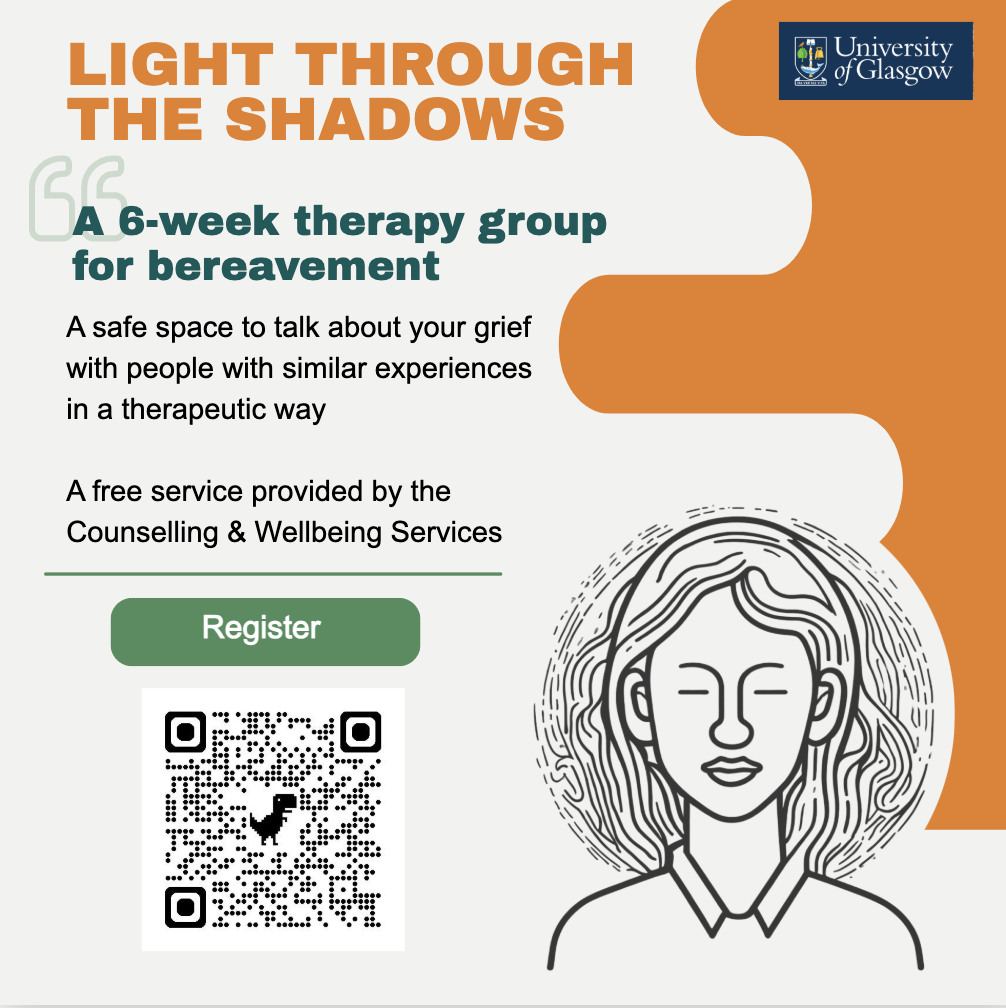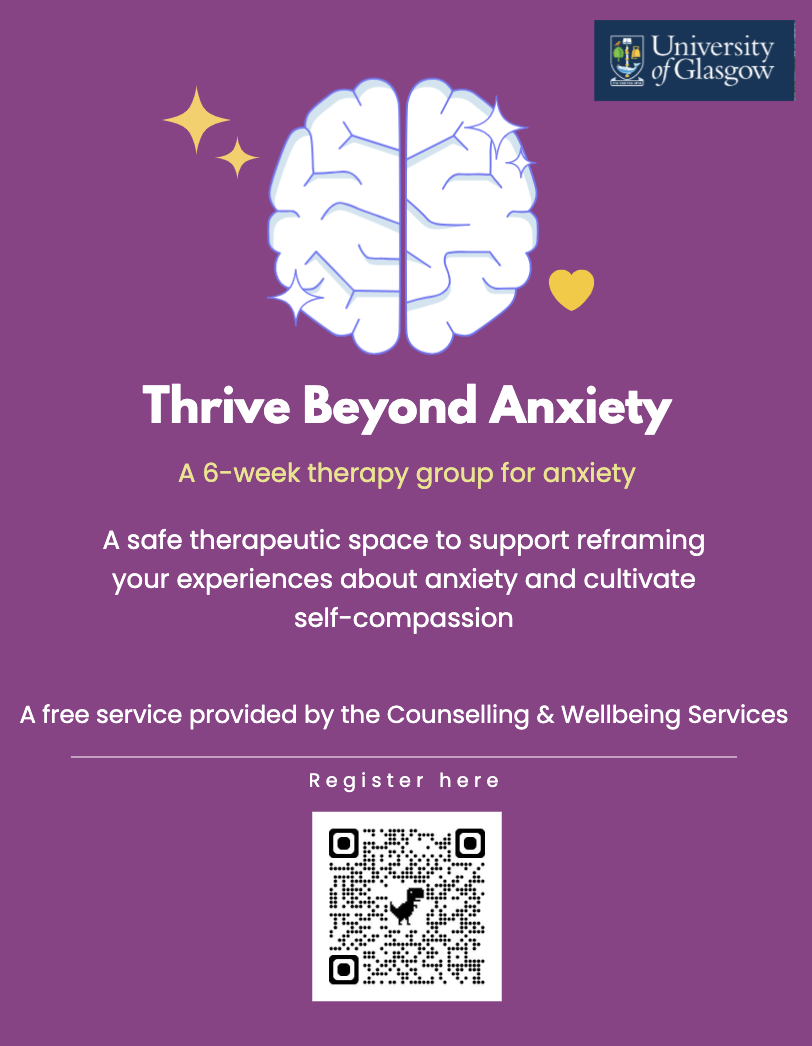The University of Glasgow has a wide range of support available to help students manage their mental health. Many students will encounter difficulties with their mental health during the course of their studies. This page explains where you can find support and assistance.
Contents
- What is Mental Health?
- Counselling & Wellbeing Services
- Crisis Support
- Health Assured: Wisdom App
- Student Listeners
- Wellbeing Matters Programme
- Bereavement Support
- Anxiety Group Therapy
- Disability Service
- What should I do if my mental health has affected my studies?
What is Mental Health?
Mental health is sometimes defined as ‘emotional health’ or ‘wellbeing’. It can be affected by life changes such as the death of a family member or the end of a relationship, or by conditions such as anxiety and depression.
Mental health problems can be temporary or permanent and will impact on a person’s mental wellbeing. How these problems impact on someone’s life will differ from person to person.
While many people find it hard to ask for help, there is support available from staff at the University of Glasgow, as well as other supports provided by services such as the NHS.
Counselling & Wellbeing Services
The Counselling & Wellbeing Services supports students with mild to moderate needs. Once you register with the service, you will receive an initial consultation and be offered appropriate support.
This includes:
- Short term, focussed blocks of therapy, subject to assessment
- Wellbeing Consultations
- Psychoeducation and group work
- Self-help resources
They can support with issues such as:
- Anxiety and panic
- Ongoing difficulties resulting from bereavement and other types of loss
- Relationship difficulties
- Mild to moderate depression
- Significant life changes
- Self-confidence and self-esteem
They cannot support with issues such as:
- Exploratory issues which are not currently impacting on functioning
- Serious violent or aggressive tendencies
- PTSD or Complex Trauma
- Incapacitating phobias/obsessive symptoms
- Unstable or severe eating disorders
- Substance addiction
- Active psychosis or serious and unstable mental health conditions
- Current and unstable suicidal/self-harming behaviours that require emergency intervention
If Counselling & Wellbeing Services cannot support you with the particular mental health issue you have, you should speak to your GP for advice.
Crisis Support
If you are worried about your own or someone else’s mental health, the following services can provide immediate assistance:
The University’s Safezone app also allows you to contact the University’s security team instantly.
If you believe your life or someone else’s is in danger, you should:
- Immediately call 999
- Notify Campus Security: Gilmorehill: 0141 330 4444, Garscube: 0141 330 2222
Additional information is available on the University's Emergency & Crisis Support page.
Health Assured: Wisdom App
The Health Assured: Wisdom app provides students with additional 24/7 support online and by phone.
The app is available for android and iOS devices and can be downloaded using the following details:
- Username: Glasgow
- Password: GrowReadSupport
Health Assured also provides a free confidential helpline: 0800 028 3766.
Student Listeners
Student Listeners are a confidential, student-led service where students can talk and share their problems either online or in person. They are volunteers students who are trained in counselling skills and provide an empathetic and non-judgmental space to listen without advising or directing the student.
You can make an appointment with a Student Listener if you're worried about something and would like the chance to talk to someone about it.
Wellbeing Matters Programme
The University's Wellbeing Matters Programme uses online workshops to address common difficulties that can affect students' mental health and wellbeing. By signing up, you'll learn practical skills and strategies to help you effectively and proactively manage your wellbeing and mental health.
You don’t need to be referred - you can sign up for sessions online, which are then delivered on Zoom. Sessions typically last 45-60 minutes.
Bereavement Support
The University has estalibshed a bereavement therapy group which exists to provide a safe and confidential space to experience bereavement in a healthy, supportive and therapeutic way. The aim is to work in a group setting where students can begin to accept the reality of their loss and to gradually learn to integrate it in a meaningful way into their lives.

Students can access the group by registering via the QR code on the image above.
Anxiety Group Therapy
The University has estalibshed an anxiety therapy group which exists to provide a safe theraputic space to allow students to reframe their experiences of anxiety and cultivate self-compassion.

Students can access the group by registering via the QR code on the image above.
Disability Service
The Equality Act 2010 defines a person as having a disability if they:
“have a physical or mental impairment, and the impairment has a substantial and long-term adverse effect on his or her ability to carry out normal day-to-day activities”.
‘Substantial’ is defined by the Act as ‘more than minor or trivial’ and ‘impairment’ is considered to have a long-term effect if it has or is likely to last for at least 12 months or beyond. In addition to the above definition, the University recognises the ‘social model’ of disability, which defines disability as created by barriers in society such as inaccessible buildings, stereotyping, prejudice, and inflexible policies and practices. The University aims to eliminate such barriers.
For example, a student who has been on anti-depressants for 12 months, may not be aware that they are in fact considered, under the legal definition, to be disabled.
It is often students with challenging mental health who suffer in silence and don’t recognise that they can engage with and receive the help from resources targeted at helping disabled students on campus.
The University Disability Service offers support to a wide range of students, including those with chronic medical or mental health conditions.
You can register with the Disability Service by email, phone or in person. You will be offered the opportunity to upload supporting medical evidence as part of the registration process.
Once you are registered, the Disability Service can liaise with academic departments regarding your requirements. You may also be offered adjustments for exams and other assessed work.
What should I do if my mental health has affected my studies?
It's generally advisable to speak with your School if you feel your mental health is impacting on your studies. Depending on your level of study, you should speak with your Adviser of Studies, Course Convenor or your Superviser. Your School can typically arrange an informal extension of up to 5 days if you need extra time to meet a deadline.
If your attendance has been affected by issues with your mental health, you should log any absences through MyCampus as set out in the University's Student Absence Policy.
If your mental health has prevented you from submitting work on time, or has prevented you from completing work to your normal standard, you should submit Good Cause. You should be aware that you must submit Good Cause no later than 5 working days after the assessment was due or the date of an exam.
If you've received a grade that you feel was impacted by issues with your mental health, you can make an academic appeal. If you wish to appeal, the first stage of an appeal requires you to write to your College. You have 10 working days (2 weeks) from the date of the decision against which you are appealing to do this.
You may be expected to provide supporting evidence to show how your health issues have affected your attendence or academic performance. For this reason, it is important to engage with the supports listed above who may be able to provide you with this supporting evidence.
The staff at the SRC Advice Centre can provide support and assistance if you need to submit Good Cause or make an academic appeal.